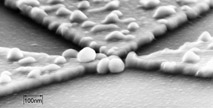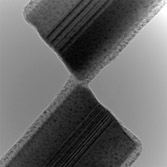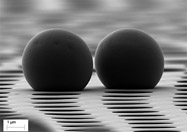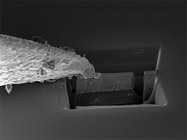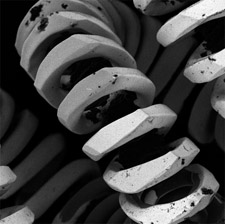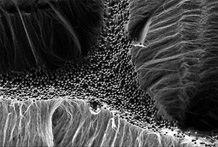What is Nanoscience?
Nanoscience is the study of small scale matter, the minuscule building blocks of the material and biological worlds. Typically nanoscientists study materials of less than 100 nanometres. 1 nanometre is one billionth of a metre. A human hair is about 50,000 - 100,000nm wide. Nanotechnologists are concerned with the behaviour of materials at these small dimensions and how they can be manipulated to do useful things.
Nanotechnology is being used to develop smaller and more powerful electronic devices, lasers, medical diagnostics and materials with completely new properties. Nanoscience is contributing to product innovation in virtually every field of manufactured goods, enabling nearly $250 billion in products in 2008, on track to exceed $3 trillion globally by 2015. In Ireland we are well positioned to play a lead role in this worldwide social and economic revolution and are ranked 6th globally for the quality of the nanoscience research carried out in our universities, especially in TCD.
Nanoscience does not belong fully to either Physics or Chemistry. Therefore, a new approach is required. An interdisciplinary degree programme marries part of both subjects so that students gain a deep and lasting understanding of the science of advanced materials that underpins the nano revolution. This is the key for the development of our Nanoscience, Physics and Chemistry of Advanced Materials N-PCAM degree programme in Trinity College Dublin.
The video below shows highlights of Nanoweek 2009, a public campaign coordinated by CRANN, which brought together the key stakeholders in developing nanoscience and nanotechnology in Ireland - government, academia and industry to highlight the importance of nanotechnology to the Irish economy.
Nanoscience and Advanced Materials
The ability to create new technologies or devices would not be possible without the use of advanced materials. Energy is an important issue for any new device, and making devices smaller approaching the nano-scale can reduce the energy cost, while increasing speed. These nanostructures or nanodevices can behave in surprising ways which are not like miniaturised versions of the macroscopic devices. Ultimately this behaviour is explicable by quantum mechanics, a branch of modern physics, but new methods of fabricating or interacting with such nanostructures is what nanoscience is all about, ideally to the benefit of technology and to people. Nanoscience incorporates applications in photonics, medical diagnostics, ultra-fast electronics and many other areas which in addition use advanced materials. Advanced materials include superconductors, polymers, lasers and optoelectronics and they can be found in applications ranging from computers and electronics, to telecommunications and broadcasting, to airlines and healthcare.
